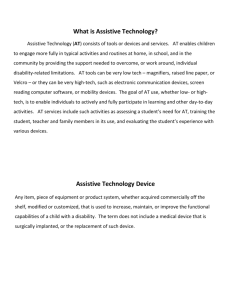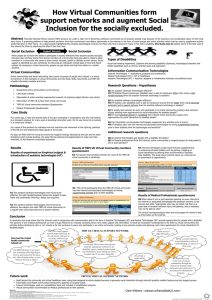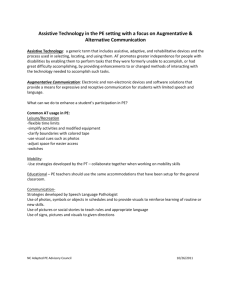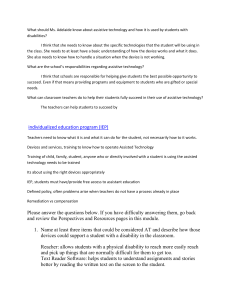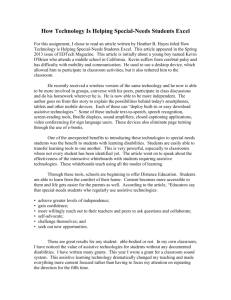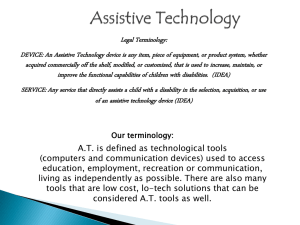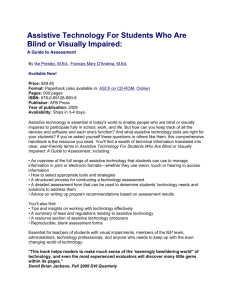Assistive Animals for the Disabled
advertisement
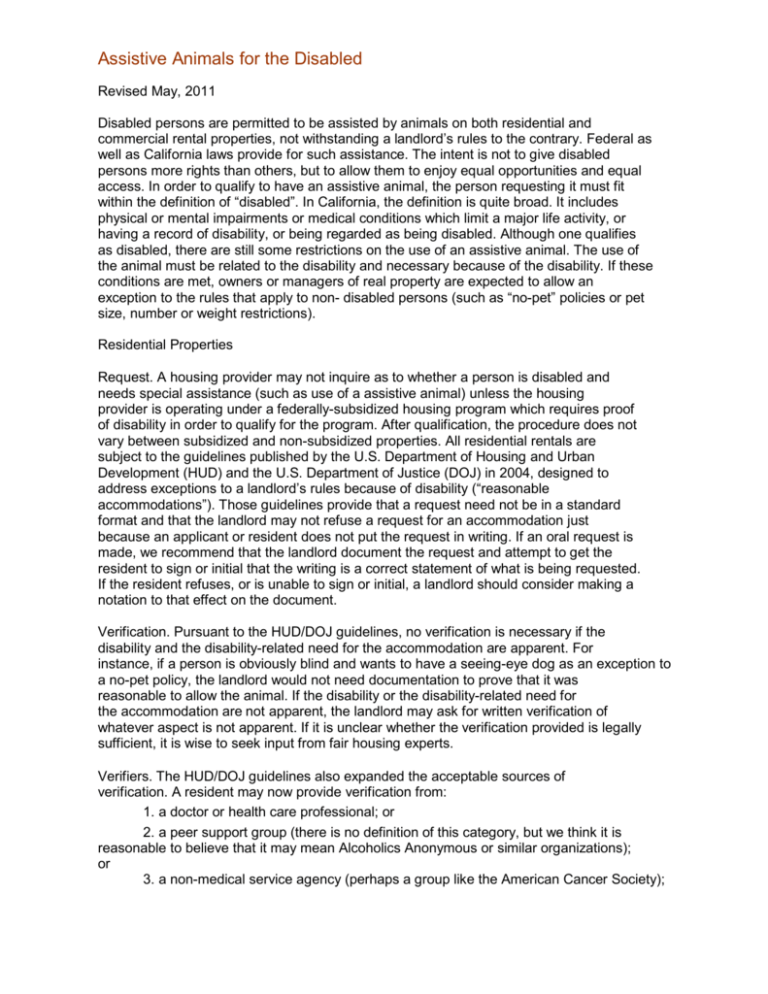
Assistive Animals for the Disabled Revised May, 2011 Disabled persons are permitted to be assisted by animals on both residential and commercial rental properties, not withstanding a landlord’s rules to the contrary. Federal as well as California laws provide for such assistance. The intent is not to give disabled persons more rights than others, but to allow them to enjoy equal opportunities and equal access. In order to qualify to have an assistive animal, the person requesting it must fit within the definition of “disabled”. In California, the definition is quite broad. It includes physical or mental impairments or medical conditions which limit a major life activity, or having a record of disability, or being regarded as being disabled. Although one qualifies as disabled, there are still some restrictions on the use of an assistive animal. The use of the animal must be related to the disability and necessary because of the disability. If these conditions are met, owners or managers of real property are expected to allow an exception to the rules that apply to non- disabled persons (such as “no-pet” policies or pet size, number or weight restrictions). Residential Properties Request. A housing provider may not inquire as to whether a person is disabled and needs special assistance (such as use of a assistive animal) unless the housing provider is operating under a federally-subsidized housing program which requires proof of disability in order to qualify for the program. After qualification, the procedure does not vary between subsidized and non-subsidized properties. All residential rentals are subject to the guidelines published by the U.S. Department of Housing and Urban Development (HUD) and the U.S. Department of Justice (DOJ) in 2004, designed to address exceptions to a landlord’s rules because of disability (“reasonable accommodations”). Those guidelines provide that a request need not be in a standard format and that the landlord may not refuse a request for an accommodation just because an applicant or resident does not put the request in writing. If an oral request is made, we recommend that the landlord document the request and attempt to get the resident to sign or initial that the writing is a correct statement of what is being requested. If the resident refuses, or is unable to sign or initial, a landlord should consider making a notation to that effect on the document. Verification. Pursuant to the HUD/DOJ guidelines, no verification is necessary if the disability and the disability-related need for the accommodation are apparent. For instance, if a person is obviously blind and wants to have a seeing-eye dog as an exception to a no-pet policy, the landlord would not need documentation to prove that it was reasonable to allow the animal. If the disability or the disability-related need for the accommodation are not apparent, the landlord may ask for written verification of whatever aspect is not apparent. If it is unclear whether the verification provided is legally sufficient, it is wise to seek input from fair housing experts. Verifiers. The HUD/DOJ guidelines also expanded the acceptable sources of verification. A resident may now provide verification from: 1. a doctor or health care professional; or 2. a peer support group (there is no definition of this category, but we think it is reasonable to believe that it may mean Alcoholics Anonymous or similar organizations); or 3. a non-medical service agency (perhaps a group like the American Cancer Society); or 4. a reliable third party (it is our opinion that this person should be qualified to the extent that his or her testimony would be acceptable as credible evidence in a court hearing); or 5. “self-verification” (for instance, it is likely that providing something such as written proof of receipt of Social Security Disability Income would suffice as self verification of a disability…although additional verification of the disability-related need might still be necessary). Reasonableness. Once verification is apparent or provided, the landlord should determine if the request is reasonable under the circumstances. The landlord is not required to allow an accommodation that would create an undue financial or administrative burden or change the nature of the operation of the business. Most requests for animals are deemed to be reasonable, notwithstanding a no-pet policy. Even if a landlord allows pets, the policies established for regulating pets do not apply to assistive animals. Thus, all pet restrictions should be disregarded and the reasonableness of each disability accommodation request should be analyzed on a case-by-case basis. Here are some Do’s and Don’ts to consider: 1. Don’t require that the animal be trained. (See below, for the distinction between accommodations for residents and rules regarding public access under the Americans with Disabilities Act). Many court cases have determined that animals which provide emotional support are included in the definition of assistive or service animals. Additionally, neither the federal Fair Housing Act nor California’s Fair Employment and Housing Act require that an assistive animal be specially trained. 2. Don’t charge pet rent, extra insurance, a pet deposit or any additional fee or deposit because of the animal. This animal is not considered a pet under fair housing law. If the animal damages the premises, the repair expenses may be deducted from the ordinary deposit, as with any other expenses for damage in excess of ordinary wear and tear, pursuant to California security deposit requirements. 3. Don’t apply number, height, weight, poundage, type or breed restrictions that are outlined in pet rules. Approval or denial of an assistive animal should be based on whether having the animal(s) on-site is reasonable. One disabled resident might need more than one animal and if there is more than one disabled resident in a household, each request from each disabled resident should be separately evaluated. As far as size, a support elephant would not be reasonable. From the standpoint of type of animal, a dangerous one (such as a rattlesnake) would not be reasonable, but many unusual animals could be. Monkeys have been trained to perform tasks for the physically disabled. Breeds such as Pit Bulls or Rottweilers (who are considered by many people to be “dangerous”) are often used as assistive animals. You should be able to require a written statement from the resident, warranting that the animal in question is not dangerous. Then you may address any behavior issues that arise. If your insurance company does not wish to insure certain breeds, our firm can contact them on your behalf to attempt to get a waiver for the purpose of accommodation. Insurance companies are required to comply with fair housing laws too. 4. Don’t require compliance with pet rules, because an assistive animal is not considered to be a pet under the law. However, landlords should be able to establish reasonable rules of conduct for assistive animals that the resident signs nd agrees to abide by. These rules should not be more stringent that the property’s pet rules. 5. Do have written policies in place for dealing with all disability-related requests, and document interactions with residents in order to reduce the likelihood of a lawsuit based on failure to accommodate. Our firm has drafted forms for disability accommodation policies and procedures, including a lease addendum for assistive animals. 6. Do be sure that all staff members are aware of the applicable fair housing rules for assistive animals, or at least know not to make comment about the issue, but rather to refer a request to a supervisor. They should also be aware that trainers of assistive animals for the disabled who apply for residency are entitled to the same rights with regard to the animal they are training as disabled persons would be. 7. Do allow disabled guests to bring assistive animals with them when they visit residents. If the disability, relation, and need are not apparent, it is a challenge to attempt to require proof that the animal is an assistive animal when it is there on a temporary basis. Unless the guest is on-site very often, or for long periods of time, it may not be productive to try to address the issue. Commercial Properties (and public areas of residential properties) Commercial properties have fewer specific regulations on the issue of animals. The Americans with Disabilities Act (ADA) addresses all places to which the public is invited, and California’s Unruh Act (Civil Code section 51 and following) addresses places that conduct “business” in the state. These laws are not as detailed on the issue of assistive animals as the fair housing laws discussed above. However, it is clear that the purpose of the code is to allow tenants of commercial properties and members of the public who visit residential or commercial properties to be accompanied by assistive animals. Under the ADA, the public is allowed to bring only trained dogs and miniature horses to public places (see the KTS legal alert on ADA changes, May 2011). Just as with guests in residential properties, the landlord does not have much ability to control visitors who claim that the animal they bring on-site is allowed as an assistive animal. The issues that would be worth addressing would likely relate to any unacceptable conduct of the animal. With regard to tenants, or employees of tenants however, the landlord may reasonably exert some control. If a landlord wishes to establish rules which may be enforceable with regard to the presence of animals, the rules should be in writing and should be part of the lease or addendum. If tenants or employees of tenants indicate that they are entitled to an exception to the rules based on disability, it is not clear that the procedure used in fair housing laws applies. Nevertheless, a landlord may be able to make a logical argument that in order to qualify for an exception, the tenant or employee should verify the right to the exception and, if that is so, the procedure used could resemble the one used for residents in rental housing Conclusion Disability is the most common basis for fair housing discrimination complaints in California residential rental communities. ADA and Unruh Act violations are also common claims made by visitors or tenants in commercial properties or the public areas of residential properties. These lawsuits are very time-consuming and expensive to defend, so it is important to make informed risk management decisions when such issues arise.

